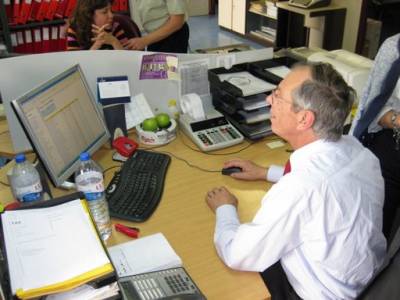Countdown to Brexit
What’s at stake for ship supply
John Davey, Representative on the OCEAN Board for BASS, the British Association of Ship Suppliers (BASS) and OCEAN Vice President explains what Brexit means for European ship supply.
Read what it means
Bearing in mind current press and reports, it may well be likely that there is a “no deal” Brexit. The following information may be helpful for our members.
On 29 March 2017, the United Kingdom initiated the official EU withdrawal process under article 50 and put the country on course to complete the withdrawal process by 30 March 2019.
In this article, I outline key considerations that are important for the specific maritime trade of ship supplies and those service providers operating in the ship supplier’s space across the European Union and the United Kingdom: simple, flexible customs, trade, taxation and maritime legislation.
Because of its particular nature, the European Ship Supply Industry needs simple and flexible customs, trade, taxation and maritime legislation. Ship supply is a unique and essential element of European maritime business, where access to vessels calling in European and UK ports alike is crucial.
Simple legislation, a border as frictionless as possible with the United Kingdom and closest possible policy and legislation alignment can support addressing the concerns in the working environment of our industry.
Our profession – in a nutshell
A ship supplier is a specialised economic operator who has to be able to supply the needs of the ship, including its crew and passengers during time spent at sea or in any EU and non-EU port, sometimes to very vessel-specific requirements or national tastes of the crew at any time of the day or night. Ship suppliers often need to put together mixed consignments with thousands of different articles in small quantities, purchased from a larger number of different sources. In the UK, the term commonly used in legislation and official guidance for ship supply is ship stores.
Ship supplying is essential for European and UK maritime trade and strong networks among ship suppliers, our customers, our suppliers, freight forwarders, maritime agents and brokers have been forged across country borders for over 40 years.
Today, UK ship suppliers source their supplies from all over the world, including also from the remaining 27 Member States of the European Union. Equally, EU ship suppliers source their goods from the UK. Today, long-term contract goods originating in the UK are stored in EU warehouses and vice versa. This is especially pertinent for those countries close to the UK, in particular, the Netherlands, France and Belgium.
If there is to be a border….
Where a border needs to be established, trade flow between the UK and the EU should be as easy and non-bureaucratic as possible, guided by:
- paperless, electronic trade;
- simplified customs and trade rules, especially on ship supplies;
- no need for customs declarations;
- access of UK ship suppliers to EU ports and vice versa.
Ship Supply must not be forgotten in “No deal” UK Customs Law
Ship supply business in both the UK and the EU needs to know the customs rules under which they will be trading on March 30th 2019. The decision cannot be part of a last-minute deal on the eve of Brexit, due to the time it will take to get trade moving under the new arrangements. The new UK “No-deal” legislation should identify these clearly.
Tax and Duty Free deliveries in the EU / UK customs & tax legislation
In international shipping, the principle of tax and duty free use of goods and services is of fundamental significance. A ship may be supplied at every port it is calling and, therefore, competition between ship suppliers depends on the cost of goods, on transport conditions and services in different ports. Freedom of taxes is one of the most important conditions to avoid distortions between different ports and different countries, and this will also be the case when the UK leaves the EU.
We mean, in practical terms, the following:
- exemption to pay VAT;
- exemption to pay excise duties.
Future EU & UK Veterinary Policy
UK ship suppliers have always dealt with ship provisions. A major part of the food for crew or passengers is of animal origin. This tends to be uncomplicated when you sell the products within domestic markets, as goods for local shops or supermarkets are usually of EU origin or come from countries outside the EU (“third countries”), but will have been customs-cleared and checked by the EU border inspection posts, i.e. the veterinary authorities.
When goods from third countries remain bonded, i.e. duty unpaid, things become more complicated. With each transit procedure, the ship supplier has to provide a set of veterinary documents: A copy of the CVED (Common Veterinary Entry Document) has to be authenticated by the local competent customs authority, in order to allow the transit procedure to start. If the goods do not comply with the EU import regulations, i.e. the goods are approved for transit only, additional documentation is necessary. These transit items require clear traceability and, as such, their supply chain is closely monitored from entry to the approved warehouse, during storage and after exit from the warehouse to the ship.
This makes it clear that OCEAN members are likely to be affected by the future European & British organisation of veterinary checks on products entering the Union or the UK. As a result, it is perceivable that the newly required pro-active management of health certificates or import licences and phytosanitary requirements could add layers of complexity, costs and uncertainty to guaranteed ‘just in time’ delivery to ship food stores between the UK and the EU. Where compliance with EU or UK import rules is checked at the border, delay will certainly occur, making food stores delivery to the UK and the EU not viable. Even if lorries are intercepted on route for compliance, the “just-in-time” model of ship supply (delivery when and wherever the vessels calls) may be threatened. BASS and OCEAN, therefore, would like for both sides to achieve the lowest-friction outcome possible.
Access to EU ports
BASS members would benefit from having access to EU ports, before and after Brexit. Conditions and fees, as well as opening hours, continue to differ across the Union and the UK and this makes fast and complete supplying often challenging, especially when supplying 24/7h and 264 days/year. The future EU and UK Port and transport policy should allow unrivalled access to ship suppliers to all maritime ports across the Union and the UK, regardless if a Union or British ship supplier wishes to deliver to a vessel on-board. A situation where rules enforcement is undertaken either at the ports, or on a random check basis should be avoided as this could subject many ship supply consignments to lengthy checks – too long for “just-in-time ship supply delivery”. The economic costs of such a result would be high, from the extra staff needed to be employed by ship suppliers, the congestion associated with the additional customs checks, to the wider economic impact of inter-continental ship supplies seizing delivery due to uncertainty over the operation of just-in-time logistics.
Instead, any deal between the EU and the UK should clarify that:
• additional customs checks that are introduced are kept to a minimum, and performed away from the ports;
• the electronic infrastructure is there already.
• customs concepts like self-assessment and mutual recognition of the AEO status of ship suppliers will allow a light touch of customs and port authorities with the ship supply industry.
We hope that, this way, the economic impact would be broadly negligible, to the extent that this scenario looks similar to the status quo.
Conclusion: OCEAN & BASS need an EU/UK Customs Union or a deep and meaningful EU/UK partnership
OCEAN and BASS do not see any benefits for European ship suppliers in the reversion to WTO standards on tariff regimes, the reintroduction of a hard customs border and the requirement of customs clearance and controls.
We require that each future deep and meaningful partnership agreement between both parties is given priority in the negotiations and that discussion focuses on eliminating all border delays and regulatory delays post Brexit, so that seamless access to all vessels calling in UK harbours is ensured for EU ship suppliers and vice versa for UK ship suppliers wishing to call EU harbours.
Useful links
EU Communication on No Deal Plans
HMG Partnership Pack




